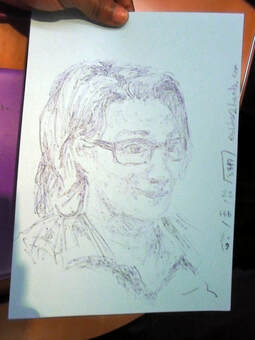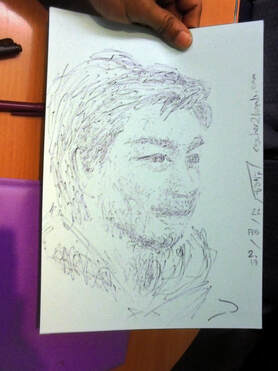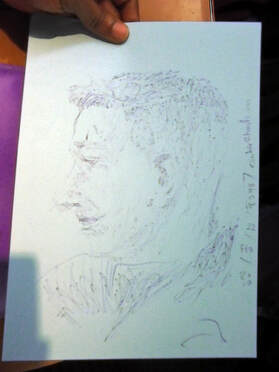I take a seat on the overnight express train. I notice the wooden panels and large, comfortable seats; the power plugs and the sliding glass doors sealing off the cabin from the train’s running noises. It’s been a long time since I was on one of these. My mind flashes back to my train ride to Cologne, on my first visit to Europe. I had put my finger on a map, pointed at a city, and took this ICE (InterCity Express) there. That was a world ago. That was before I packed up my things, signed a contract, and moved to this side of the Atlantic Ocean.
Across from me sit two teenagers. Some friends are going to join them a few stops from now, I overhear. They talk away in German, focusing only on their conversation. One of them glances in my direction and stops. I’m drawing him. He just noticed. He tries to keep talking but finds it difficult—he’s too distracted by my two hands. My two pens keep scratching at a yellow piece of A4 paper, ‘printing’ his face from top to bottom. Yes, I speak up, I’m drawing you. The two start to laugh. And we start to talk. How old are we? Where are we all from? What will we each be doing in Berlin?
The conversation flows easily, even as we reach our first stop. A woman with short brown hair and glasses, wearing a pantsuit boards our train car. She looks around for a seat. With eyebrows raised, she points to the seats beside me. They’re free, I reply. She smiles and stows her luggage above her. She takes a seat, and looks intently at her phone. Her thumb swipes up and down at regular intervals. The teens and I keep talking. They’ve bought tickets to see a motivational speaker. They’re travelling to the other side of the country just to hear someone talk. I guess he must be famous. It’s a part of the culture I still know nothing about.

We talk about confusing parts of the German language. With this change in topic, the woman chimes in: “isn’t it the craziest thing that umfahren (to run over something) is the opposite of umfahren (to drive around something)?” She speaks fluent German. She moved here from Brazil seven years ago. Now they talk rapidly, about the many quirks and eccentricities in the language that she learned the hard way. They move on to German male comedians and female comedians adept at using the quirks of the language for laughs. They speak about the legends of the genre—it’s a part of the culture I still know nothing about. She gives me a brief introduction to German political parties (to many laughs from the teenagers) and warns me about those crazy Swabians (people from a certain region in Germany). And we talk about Brazil. We talk about the amazing waterfalls at one border of her country. How you can hear the loudest roar ever, from the walls of water thundering its way down, in the longest continuous waterfall in the world.
Our conversation is one-dozen topics. The woman’s stop is soon arriving. We start to say our goodbye’s to her. She’ll get off at this late night stop. We’ll ride on into the morning. “This was an amazing conversation,” the teen I drew first says. “I’ve been taking trains since I was a kid, but I’ve never had a conversation with the people sitting around me like this.” The other teen nodded eagerly in agreement. The Brazilian expressed her assent, too. But I am shocked. Aren’t all train rides like this? I think.
I don’t want to ruin their moment. For them this is a once-in-a-lifetime moment of magic. For me, it’s only the second nice conversation of the night. The previous was with some tourists from Japan who told me: “I’ll miss you,” when we parted.
Aren’t all trains like this? Sure, there isn’t often time on the subway to dive deep into conversations. There isn’t often time on city buses to get to know your neighbors. But on these big, long distance, high speed trains…you have the best chance to talk. You should.
Because all train rides can be like this. It just takes the courage to be curious about the person sharing the ride with you.


 RSS Feed
RSS Feed